- Biography
- Repertoire
- Discography
- Reviews
- Itinerary
- Media
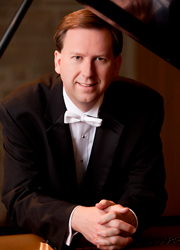
Lauded in Gramphone for his “abundant energy, powerful fingers, big sound, and natural musicality” and praised by the San Francisco Chronicle for his “fervency and panache,” American pianist CHRISTOPHER ATZINGER is celebrated for insightful performances and a reputation for excellence
Christopher has performed extensively throughout the United States and Europe, highlighted by appearances at Carnegie Hall (New York), Salle Cortot and American Cathedral (Paris), St. Martin-in-the-Fields (London), National Concert Hall (Dublin), The Grieg Academy (Bergen), American Academy (Rome), Academy of Music (Kraków), Liszt Museum (Budapest), Barrocco Cultural Arts (Valletta), Smithsonian Gallery of American Art and The Phillips Collection (Washington, DC) and Dame Myra Hess Series (Chicago). He has also appeared at the Banff International Keyboard Festival, Brevard and Mendocino music festivals, Bridge and Park City chamber music festivals and the Chautauqua Institution.
As guest soloist, Christopher has appeared with the Louisiana Philharmonic Orchestra, North Carolina’s Brevard Repertory Orchestra and the symphony orchestras of Austin, Duluth Superior, Jackson (MI), La Crosse (WI), Mankato (MN), McAllen (TX), Mississippi, Shreveport, Springfield (MA) and St. Olaf, under the batons of Steven Amundson, Peter Bay, Crafton Beck, Peter Dabrowski, Dirk Meyer, Stephen Osmond, Alexander Platt, Kevin Rhodes, Mischa Santora, Klauspeter Seibel, Dennis Simons and Steven Smith.
Christopher’s live performances have aired on radio stations WFMT-Chicago, WJR-Detroit, WXEL-South Florida, KPAC-San Antonio, WUOL-Louisville and WGTE-Toledo, while his artistry has also been heard on Kansas, Minnesota, New England and South Dakota Public Radio, along with television stations in Chicago and Cincinnati. His recordings have been featured nationally on American Public Media’s Performance Today, WQXR-New York and WGBH-Boston and on Netherlands Public Radio (NPO Radio 4).
On CD, Christopher has three highly praised albums released on MSR Classics - a debut solo recording of Bach, Beethoven, Barber and Fritze; an all-Brahms album; “American Lyricism” with scores by Richard Danielpour, Monica Houghton, Pierre Jalbert, Justin Merritt and Christopher Theofanidis. He has also recorded works of John Knowles Paine for Delos, Judith Lang Zaimont for Naxos and Amy Beach for Centaur Records.
A medalist of the New Orleans, San Antonio, Cincinnati, Shreveport and Seattle international piano competitions, Christopher was also a winner of the National Federation of Music Clubs Artist Competition and the Simone Belsky Piano Competition, as well as the Premio Città di Ispica prize at the IBLA Grand Prize Competition in Italy. Additionally, he is the recipient of grants and fellowships from the Theodore Presser Foundation, Foundation La Gesse, American Composers Forum and Joyce Dutka Arts Foundation. He was also awarded a McKnight Fellowship for Performing Artists.
A native of Michigan, Christopher Atzinger began piano studies at age six. He holds degrees from the University of Texas at Austin and University of Michigan, and earned the Doctor of Musical Arts degree in piano performance from the Peabody Conservatory of Johns Hopkins University. Among his principal teachers he counts Julian Martin, Robert McDonald, Anton Nel, David Renner and Carolyn Lipp. Additional keyboard studies were undertaken with Timothy Lovelace, Edward Parmentier and Penelope Crawford. A dedicated teacher and coach, himself, Dr. Atzinger served on the faculty of Pennsylvania’s Dickinson College, prior to his current appointment as Professor Music at St. Olaf College in Minnesota. He has also lectured at The Juilliard School and Berklee College of Music, conducted masterclasses throughout the United States and taught at the Summer Music Academy at the Krzysztof Penderecki Academy of Music in Kraków, Poland.
When not on-stage or in the teaching studio, Christopher can be found spending time with his three children, Abigail, Brandon and Isaac. In his spare time, he enjoys college football, traveling and exploring new restaurants.
[CHAMBER ENSEMBLE REPERTOIRE FOLLOWS CONCERTO LIST]
BARBER
Concerto, Op. 38
BEETHOVEN
Concerto #2 in B-flat, Op. 19
Concerto #4 in G, Op. 58
Concerto #5 in E-flat, Op. 73 (“Emperor”)
Concerto in C, Op. 56 (“Triple”)
Fantasia in c, Op. 80 (“Choral Fantasy”)
BLOCH
Concerto Grosso #1
GRIEG
Concerto in a, Op. 16
LISZT
Concerto #1 in E-flat
MacDOWELL
Concerto #2 in d, Op. 23
MENDELSSOHN
Concerto #1 in g, Op. 25
MOZART
Concerto #9 in E-flat, K. 271
Concerto #10 in E-flat for 2 Pianos, K. 365
Concerto #19 in F, K. 459
RACHMANINOFF
Concerto #2 in c, Op. 18
SAINT-SAËNS
Africa, Op. 89
Concerto #2 in g, Op. 22
Concerto #5 in F, Op. 103 (“Egyptian”)
VINE, Carl
Concerto #1 (1997)
| ARENSKY | Piano Trio in d, Op. 32 |
| ARUTIUNIAN | Suite for Clarinet, Violin & Piano |
| BRAHMS | Piano Quartet #1 in g, Op. 25 |
| BRITTEN | Canticle III: Still Falls the Rain for Tenor, Horn & Piano, Op. 55 |
| BRUCH | 8 Pieces for Clarinet, Viola & Piano, Op. 83 |
| FAURÉ | Piano Quartet #1 in c, Op. 15 |
| FRANCK | Piano Quintet in f |
| HARBISON | Songs America Loves to Sing (2004) |
| HAYDN | Piano Trio #39 in G, Hob. XV:25 (“Gypsy”) |
| MOSZKOWSKI | Suite for 2 Violins & Piano, Op. 71 |
| MOZART | Clarinet Trio in E-flat, K. 498 (“Kegelstatt”) Piano Quartet in g, K. 478 |
| RUSH, Stephen | Sextet |
| SAINT-SAËNS | Carnival of the Animals Septet in E-flat for Trumpet, Strings & Piano, Op. 65 |
| SCHUMANN | Piano Quartet in E-flat, Op. 47 |
| SIROTA | Piano Trio (1998) |
| TURINA | Círculo (Piano Trio), Op. 91 |
| WEBER | Trio in g for Flute, Cello & Piano, Op. 63 |
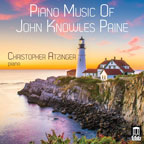 |
"PIANO MUSIC OF JOHN KNOWLES PAINE" Romance, Op. 39 DELOS: DE 3551 |
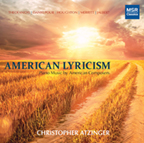 |
"AMERICAN LYRICISM" Theofanidis: All Dreams Begin with the Horizon (2007) MSR Classics: MS 1534 |
 |
JUDITH LANG ZAIMONT: Sonata (1999-2000) NAXOS: 8.559665 |
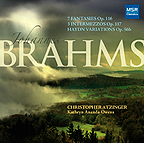 |
BRAHMS: 7 Fantasies, Op. 116 MSR Classics: MS 1235 |
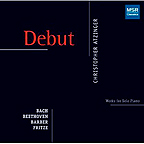 |
"DEBUT" J.S. BACH: Prelude & Fugue in g#, BWV 863 MSR Classics: MS 1189 |
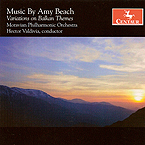 |
"MUSIC BY AMY BEACH" Variations on Balkan Themes for Two Pianos, Op. 60c Centaur Records: CRC 2990 |
Atzinger is blessed with abundant energy, powerful fingers, a big sound and natural musicality. He makes the best possible case for Gregory Fritze’s well made 1989 Sonata, moulding the jagged, proclamatory unison motifs and full-throated chords in contrary motion with immense authority, taking great care with the slow movement’s inside-the-piano strumming and plucking. Atzinger more than holds his own against the Barber Sonata’s finest recorded practitioners (Horowitz, Cliburn, Browning and Wild) and benefits from MSR’s warm, roomy and most attractive engineering.
GRAMOPHONE
On Oct. 16, I caught the first half of a[n Austin Symphony Orchestra] program at a packed Dell Hall. In some ways, it was if the performances had never gone away. The full orchestra was well matched to guest pianist’s Christopher Atzinger's reading of Greig's Piano Concerto in A Minor, at first exceptionally tender, then unreservedly dramatic. The audience retained a leading role in this show with an instantaneous standing ovation and a reminder that, without them, the music would mean much less.
AUSTIN AMERICAN-STATESMAN
[John Knowles] Paine’s piano music hasn’t really been explored in much depth, so all thanks are due to Christopher Atzinger for getting to grips with a body of his piano repertoire. The main focus falls on the ‘MacDowell’ element in Paine’s piano writing, his powers of descriptiveness and characterisation. This can be found best in the ‘ten sketches for the piano’ In the Country. This cycle includes sparkling birdsong, Schumannesque refinement, pert dances, genteel rainfall, quiet tristesse - Elysian miniatures cast in a prelapsarian idyll. Atzinger locates the essentially relaxed and good humoured element in Paine’s writing and he has been attractively recorded.
MUSICWEB INTERNATIONAL
Soloist Christopher Atzinger gave the work [Barber Piano Concerto] a marvelous ride. He projected a thorough mastery of its numerous Himalayan hurdles, his hands blurring over the keyboard, churning out fusillades of octaves and parallel sixths in the craggy ‘Allegro appassionato’ and galloping ‘Allegro molto’ movements, caressing the ivories in the melancholy traceries of the central ‘Canzone.'
THE REPUBLICAN (Springfield, MA)
Atzinger proves himself to be a master of the fugue in his debut recital. Beginning with Bach, the original and supreme master of the fugue, then progressing through late Beethoven to arrive at the brilliant final movement of the Barber sonata, we are treated to a great overview of this form. There are no weak movements, only wonderful music-making. Christopher Atzinger is surely a pianist to keep a watch for.
AMERICAN RECORD GUIDE
The Barber Sonata seems to be an Atzinger calling-card, with its high-flown, percussive lyricism. Atzinger bestows upon the opening Allegro energico the same taut, hard-edged patina we know from the Horowitz and Browning versions. The second movement Scherzo might be Barber’s equivalent of a Liszt etude, according to Atzinger’s playful fingers. The Adagio brings out Barber’s concession to ‘modernism’ and Schoenberg, but it retains a bluesy, American character. The fugal last movement has Atzinger in molten form, providing ardent, scintillating evidence of his technical and sympathetic commitment to this music.
AUDIOPHILE AUDITION
[Schubert’s Sonata in B-flat major] is beloved less for its technical arrangement than for the festive, gently hymn-like feeling it projects. This was brought across masterfully by Christopher Atzinger with an aesthetically rich performance. He unlocked the thematic richness of the first movement, gave the andante sostenuto an introverted, song-like treatment, and lent ‘delicacy’ to the scherzo. The rondo of the final movement was charged, stirring.
SCHWARZWÄLDER-BOTE (Germany)
The first is an uncommonly fine release. Late Brahms piano pieces are intricate, sometimes difficult works, so I like to follow them with a score. With the music in front of me I was doubly aware of the hundreds, no thousands of little rhythmic adjustments–agogic accents, rubato, and the like–that Atzinger brings to the music. He has fantastic control of rhythm in his shaping of phrases, and his ability to bring a hidden melody to the foreground is exemplary. All the pieces are paced very well, and the piano sound is excellent. Atzinger is a pianist to watch.
AMERICAN RECORD GUIDE
The two large pieces on this disc [Zaimont Sonata; A Calendar Set], played with fervency and panache by pianist Christopher Atzinger, provide a glimpse of both her monumental vein and her more intimate voice - and both are compelling.
SAN FRANCISCO CHRONICLE
| 8/27/2025 (7pm) | ACADEMY OF MUSIC SUMMER FESTIVAL (Krakow, Poland) Floriana Concert Hall Beethoven: Piano Sonata #22 |
| 2/26/2026 (7pm) | MISSISSIPPI COLLEGE (Clinton) Jean Pittman Williams Recital Hall, Aven Fine Arts Building Beethoven: Piano Sonata #22 |
| 2/27/2026 (7:30pm) | THE UNIVERSITY OF SOUTHERN MISSISSIPPI (Hattiesburg) Marsh Auditorium, Fine Arts Building Beethoven: Piano Sonata #22 |
